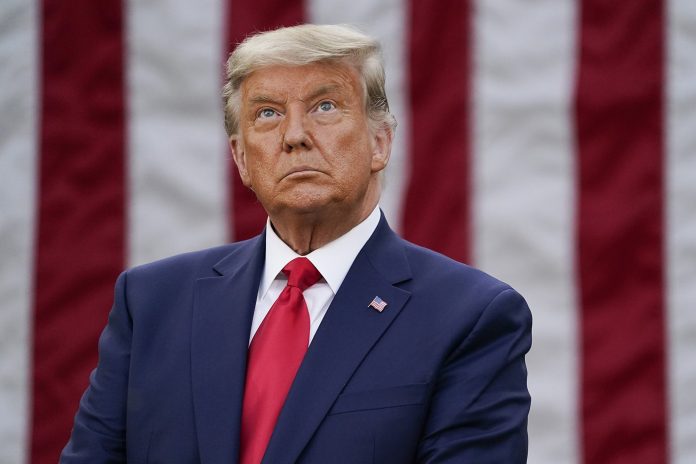
Washington, Feb 7 (IANS) Former President Donald Trump has decided to file a plea in the US supreme court against a ruling of the appeals court that rejected all of his presidential immunity defences.
The appeals court set a time limit for a Supreme Court appeal to prevent delay as the elections were just 10 months away.
Trump is appealing shortly to the apex court in keeping with the appeals court deadline. The former president “respectfully disagrees” with the ruling, according to a statement from campaign spokesman Steven Cheung.
Cheung said that “without complete immunity, a President of the US would not be able to function properly.”
Trump will move the Supreme Court, where he can hold out hope that the conservative majority – three members of which he appointed – will rule in his favour.
The federal appeals court ruling Tuesday denying Trump’s ability to invoke presidential immunity in the face of criminal charges is the latest legal blow for the former president even as he marches triumphantly towards being the most likely GOP nominee in the 2024 election, though Nikki Halley is the last woman standing before him.
The unanimous decision by a three-judge panel of the US Court of Appeals for the D.C. Circuit held Trump cannot invoke immunity as a defense against charges connected to his attempts to overturn the 2020 presidential election and a violent insurrection at the Capitol in January 6, 2021.
The panel rejected “all three potential bases for immunity both as a categorical defence to federal criminal prosecutions of former Presidents and as applied” to Trump’s particular case, media reports said.
“For the purpose of this criminal case, former President Trump has become citizen Trump, with all of the defences of any other criminal defendant,” the panel’s ruling says adding, “But any executive immunity that may have protected him while he served as President no longer protects him against this prosecution.”
The major takeaways from the appellate panel’s ruling cover his immunity, his campaign and his timetable for the GOP nomination in the presidential race for 2024.
The Appeals Court in DC has rejected every thread of Trump’s argument for immunity. Ruling it had jurisdiction to decide on immunity, the judges rejected key grounds on which Trump’s legal team based their defence, knocking the plank completely.
Ruling out presidential immunity, the court said Trump’s acts of January 6, 2021 fell out of immunity jurisdiction. It said, “any act (of Trump) was conceivably within the outer perimeter of his executive responsibility.”
As laid out by the panel, two of Trump’s arguments were rooted in the separation of powers doctrine derived from the Constitution, while a third rested on the claim that a former president could not be criminally prosecuted without Congress first impeaching and convicting him.
Citing legal precedent and immunity rules for legislators and judges, the appellate panel disagreed with the contention that courts like theirs were barred from hearing criminal charges against Trump due to the separation of powers, the US News and World Reports pointed out.
“The Indictment charges that Trump violated criminal laws of general applicability,” the court was of the opinion.
“Trump lacked any lawful discretionary authority to defy federal criminal law and he is answerable in court for his conduct.”
The three-judge panel found that “the interest in criminal accountability, held by both the public and the Executive Branch, outweighs the potential risks of chilling Presidential action and permitting vexatious litigation” and that “voters’ interest in democratically selecting their President” helped “compel the conclusion that Trump is not immune from prosecution under the indictment.”
The panel rejected Trum’’s claim that criminal prosecution of a former president can only occur upon his conviction in impeachment proceedings, as well as related arguments surrounding “double jeopardy.”
“No court has previously imposed such an irrational ‘impeachment first’ constraint on the criminal prosecution of federal officials”” the court opined.
Double Jeopardy in legal jargon means that an accused cannot be tried for the same offence twice.
The Judges Were Bipartisan Appointees but united in their opinion: The appellate panel’s ruling affirmed a lower court ruling by Judge Tanya Chutkan, who was appointed by President Barack Obama and randomly assigned to oversee the election interference trial. The panel ruling was unanimous and effectively bipartisan, with Democratic- and Republican-appointed judges in agreement.
The three judges on the panel were – Judge Karen LeCraft Henderson, appointed by President George H.W. Bush in 1990. – Judge J. Michelle Childs, appointed by President Joe Biden in 2022. – Judge Florence Y. Pan, appointed by President Joe Biden in 2022
A Make-or-Break Legal Week for Trump? There’s a Limit on the time and manner for Trump to appeal.
Trump has two options before him, legal experts said. First was the option of asking for a rehearing, and the second was asking the full circuit court in DC to reconsider the case or appeal to the Supreme Court. Such options when exercised by Trump would succeed in delaying the case significantly. But the appeals panel appears to have considered that possibility and taken a step to prevent such delays.
Conjunctly while delaying Presidential immunity, the appeals panel prevented delivery to the trial judge of the “mandate” enforcing their ruling through February 12. This effectively places their ruling on hold to give Trump and his legal team time to appeal to the Supreme Court.
Such an appeal would stay implementation of the panel’s ruling until the high court acted. But, the judges specified, a request for a rehearing or an appeal to have the full appellate court hear the case would not. In that case, the decision would only be put on hold if the request for review by the appeals court were accepted – perhaps signalling the unlikelihood of such a request being granted.
“The Clerk is directed to withhold issuance of the mandate through February 12. If, within that period, Appellant notifies the clerk in writing that he has filed an application with the Supreme Court for a stay of the mandate pending the filing of a petition for a writ of certiorari, the Clerk is directed to withhold issuance of the mandate pending the Supreme Court’s final disposition of the application,” the order states.
“The filing of a petition for rehearing or rehearing en banc will not result in any withholding of the mandate, although the grant of rehearing or rehearing en banc would result in a recall of the mandate if the mandate has already issued.”
This order is an attempt to prevent delay, with Election Day just about 11 months away, legal experts opined.




